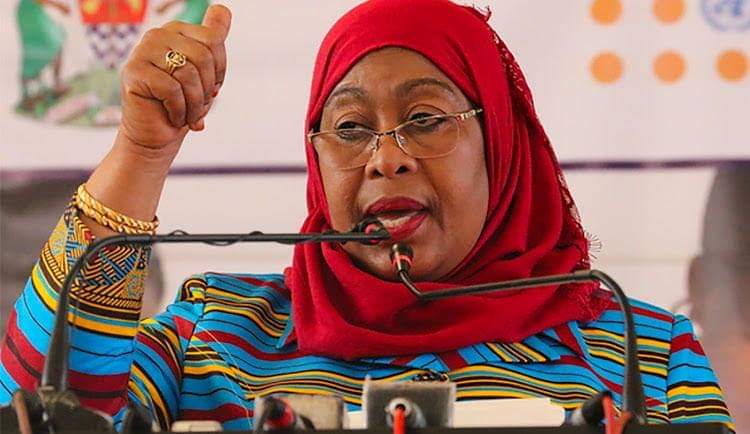
In 2014, when Samia Hassan said the social order in her country “does not give room for a woman to assume the highest position”, she couldn’t have known what fate had in store for her. In that same interview, the vice-president of Tanzania was asked if she wanted to contest for the presidency — and she responded thus: “If people ask me, I would not hesitate to serve them.”
Following the death of President John Magufuli of Tanzania, Hassan is set to attain the highest position in her country — and she will no doubt be ready to serve.
The Tanzanian government had announced the death of Magufuli on Wednesday, two weeks after he went off the radar, fuelling speculation that he had contracted COVID-19.
Hassan made the announcement in a live television broadcast, noting that the president died of heart disease complications at a hospital in Dar es Salaam, former capital of Tanzania.
HASSAN’S JOURNEY FROM CLERK TO VICE-PRESIDENT
Born on January 27, 1960, Hassan attended Chawaka and Mahonda primary schools in Unguja and Ziwani Primary in Pemba Island.
She then went on to Ngambo in Unguja Islands for her secondary education but later transferred to Lumumba, also in Unguja Islands. Upon completion of her secondary education, she joined the ministry of labour and national planning as a clerk in 1977.
In 1986, she attended Mzumbe University where she earned an advanced diploma. In 2015, Southern New Hampshire University, in partnership with the Open University of Tanzania, awarded her masters degree in science (community development). She was also awarded a postgraduate diploma from the University of Manchester in 1994.
In 2000, Amani Karume, president of Zanzibar, appointed Hassan as minister of labour, gender development and children after she was elected to the Zanzibar house of representatives. Zanzibar, a Tanzanian archipelago, has a semi-autonomous government.
Hassan subsequently served as the minister of tourism, trade and investment from 2000 to 2010, after which she got elected into the Tanzanian national assembly, winning 80 percent of the votes. She was thereafter appointed minister of state for union affairs.
On November 5, 2015, Samia set a record as she was sworn in as the first female vice-president of Tanzania, under the recently deceased Magufuli.
Hassan and Magufuli were re-elected for a second term in 2020.
LOOKED DOWN ON BY MALE COLLEAGUES
Even with her achievements, her political journey was not completely smooth as some of her male counterparts had refused to see past her gender.
In an interview with Tanzania Daily News, Hassan recalled how some of her male colleagues attempted to belittle her while serving as the only senior female cabinet minister in Zanzibar.
“I stood my ground and eventually they appreciated my contributions. After the elections in 2005, the number of women ministers increased to four, three were full ministers while one was a deputy cabinet minister,” she said.
“I have risen to this position as a result of my competence and not through favours.”
TANZANIAN PRESIDENT-DESIGNATE
According to the Tanzanian constitution, upon the death of the president, the vice-president is to be sworn in and become president for the remaining period of the five-year tenure.
The constitution states “the office of the president becomes vacant by reason of death, resignation, loss of electoral qualifications or inability to perform his functions due to physical infirmity or failure to discharge the duties and functions of the office of the president, then the vice president shall be sworn in and become the president for the expired period of the term of five years and in accordance with the conditions set in article 40”.
Barring an extraordinary event, Hassan is expected to be sworn in as the next president of the country and will serve till 2025 when Magufuli’s tenure is supposed to end.
Upon taking the oath of office, Hassan will become the first female president of Tanzania.
As president, she will consult with the ruling party to decide the appointment of the next vice-president. Fifty percent of the members of parliament must be in agreement with the decision.
ONLY FEMALE EXECUTIVE PRESIDENT IN AFRICA
Of the 54 countries in Africa, the majority have executive presidents, all of which are men.
When Hassan is sworn in, she will become the second and only serving female executive president in Africa. Hassan would be second to Ellen Johnson Sirleaf, who served two terms as Liberia’s president from 2006 to 2018.
What this means is that as the president, Hassan will operate independently of the legislature and will exercise control over the executive branch.
This is in contrast to a ceremonial president who only exists to fulfill symbolic functions, and has very little authority or influence.
Unlike Sahle-Work Zewde, president of Ethiopia, who occupies a ceremonial one, Hassan would wield real power when inaugurated.
She would also be the first female president of an East African country.












